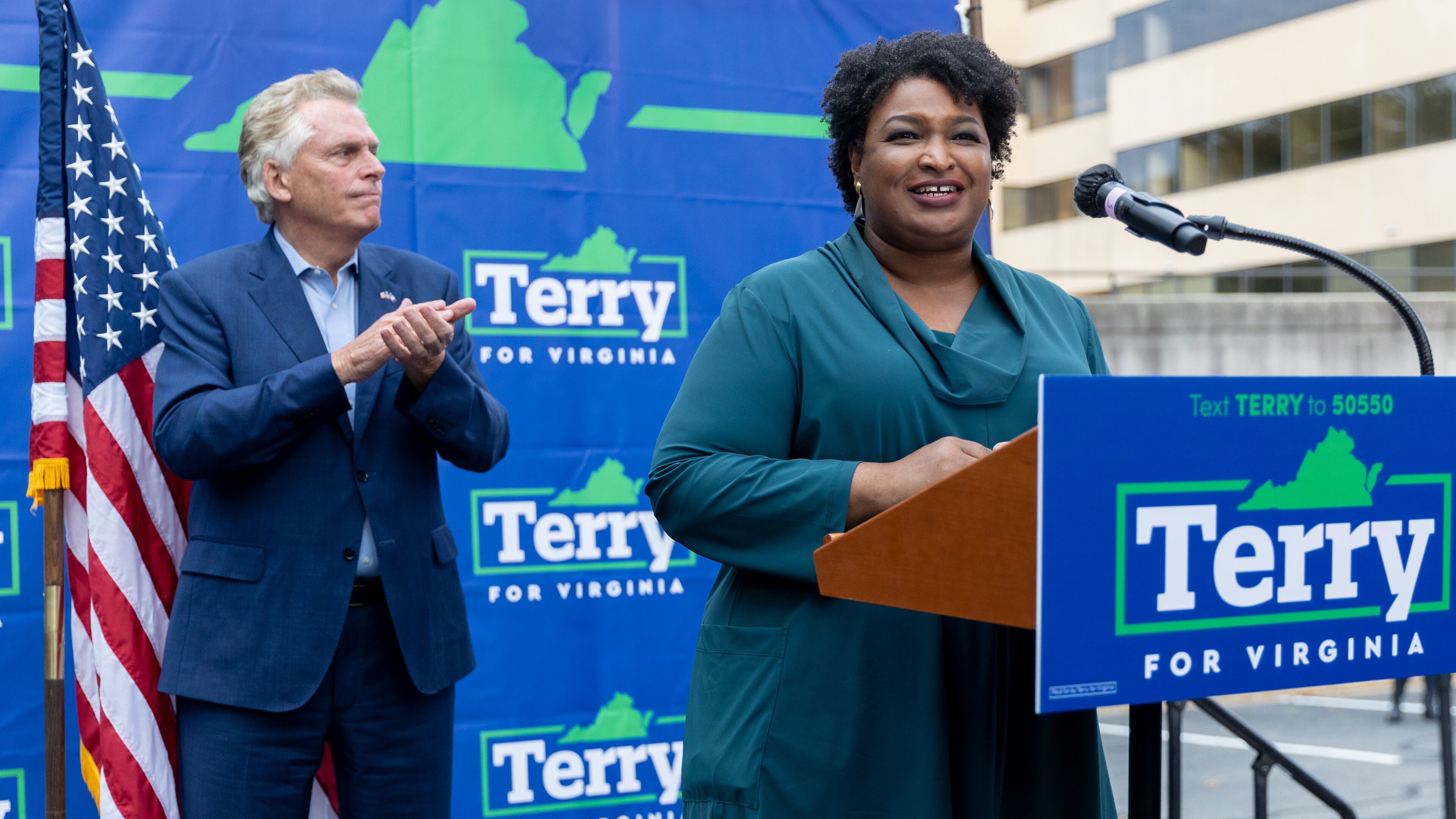Governor’s race in Virginia leaves lessons for Georgia

RESTON, Va. — A toss-up governor’s race with nationwide implications made for a steady pace of voters at the north Fairfax County human services office, even with rain showers.
Maxine Greenstein, a volunteer for the Democratic Party who distributed flyers outside the precinct Tuesday, observed high turnout but few people looking for last-minute information on the candidates.
“Most people, I think, have their minds settled, and it’s pretty divisive,” she said. “There is really no middle ground.”
The outcome of the race between Republican Glenn Youngkin and Democrat Terry McAuliffe won’t have a direct bearing on what happens next year in Georgia, where a rematch is expected between Gov. Brian Kemp and Democrat Stacey Abrams.
But Democratic Party leaders felt the race was important enough that it invited Atlanta Mayor Keisha Lance Bottoms and Abrams to campaign with McAuliffe. And members of both parties will be looking for clues about the future.
Virginia’s gubernatorial election often serves as a litmus test on how voters perceive the party in power in Washington. Democrats not only control both branches of Congress and the White House, but Virginia’s Legislature, too.
Republicans and Democrats in Georgia will study election results and turnout trends from Virginia, hoping to apply those lessons in next year’s midterm election.
Ranada Robinson is research director of the New Georgia Project, a voter registration organization founded by Abrams. Robinson said Georgia and Virginia aren’t comparable demographically because Georgia’s electorate has a higher percentage of voters of color, but the organization is still keeping tabs on Virginia.
“I wouldn’t say that we are paying attention necessarily to the outcome,” she said. “But more so, in factors like the turnout rate of communities of color, election fatigue and those types of issues so that we can see how they’re similar to Georgia and how they’re navigating it in Virginia and how we can navigate better.”
Virginia’s governor’s race has received national attention because it is in a state where Democrats are increasingly becoming more powerful but Republicans still have opportunities to win. It also helps that it is one of only two states — New Jersey being the other — that elects its governor the year after a presidential election.
Over 1 million voters in Virginia voted early out of nearly 6 million registered voters. The most recent polling showed a tightening race after Youngkin made gains on McAuliffe in the closing days of his campaign.
Virginia is yet another place where statewide races have become ever more nationalized. McAuliffe, a former governor, in particular, shaped his campaign around a proxy battle between former President Donald Trump and President Joe Biden.
At Abrams’ rally last week in Charlottesville, her second appearance in Virginia, she said Virginians have an opportunity to show Georgia and the nation which direction they want the country to follow.
“I know that Virginia and Georgia are yoked together,” Abrams said. “That what you all did here will determine the next four years for this country. It will determine the next decade on rights and opportunity, or it will signal that we are going backward.”
This focus on nationalizing the race may hurt McAuliffe because Biden’s approval ratings have fallen, GOP strategist Alice Stewart said. Meanwhile, Youngkin resisted aligning too closely with Trump, declining to campaign with the former president while still welcoming his support.
Youngkin instead focused on hot-button culture war issues pushed by Republicans nationally, such as opposition to mask mandates and the way America’s history on racial issues is taught in schools. Ground zero for his campaign became conservative Loudoun County, a Washington suburb that is the state’s fastest-growing locality.
“You can’t be a Trump Republican or a non-Trump Republican, you need to be your own Republican,” Stewart said. “And that is what Youngkin was able to do. He was his own candidate, he focused on the issues, and he focused on policies.”
Stewart, who grew up in the Atlanta area and now lives in Alexandria, another Washington suburb, said Republican candidates from Georgia should follow that same blueprint.
“I think McAuliffe tried to make this more of a national race and all about Trump, and at this point, I think he’s regretting it,” she said.
Emory political science professor Andra Gillespie grew up near Richmond and said Virginia and Georgia are two states with very different narratives surrounding their governor’s races.
The lack of an incumbent helped define the Virginia contest, although McAuliffe is a former governor. In Georgia, the race would feature a seated governor, Kemp, versus a Democratic challenger. If that challenger is Abrams, she energizes young voters and voters of color in ways that McAuliffe did not, Gillespie said.
“The candidates matter, the partisan dynamics within each state are different,” Gillespie said. “The demographic composition of the state matters, so the fact that there are more white Democrats in Virginia, it explains why they’ve been more consistently Democratic than other states in the South. Georgia is more likely to be like North Carolina than it is to be like Virginia in the long run.”



